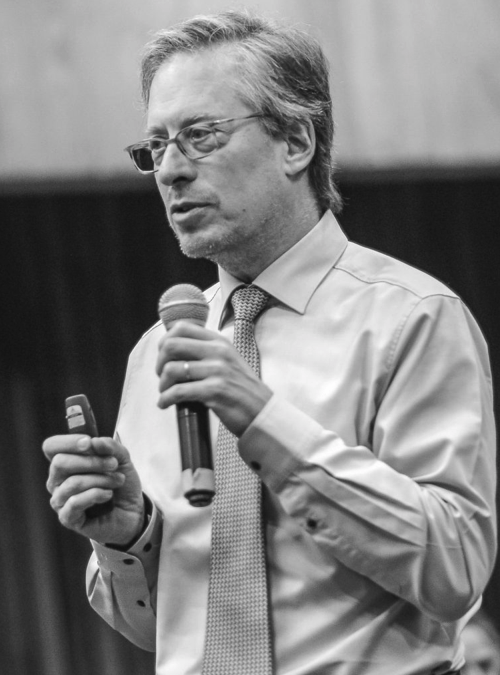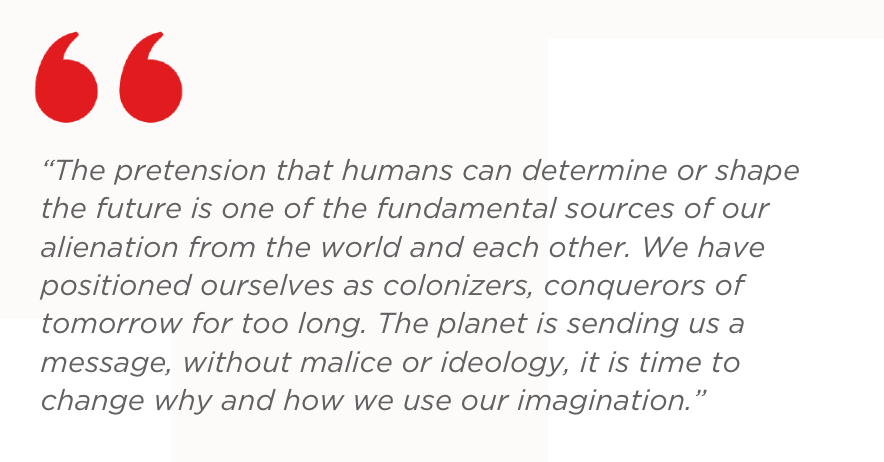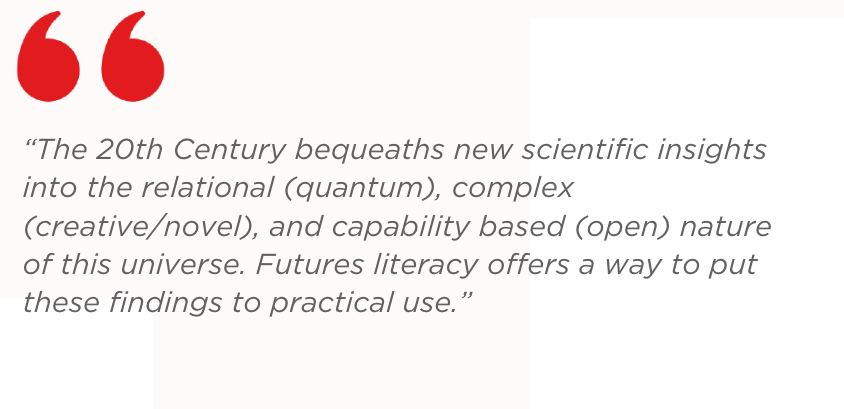In this interview, Mudabbir Maajid speaks to Riel Miller, an expert in futures studies and futures literacy. Riel is a renowned authority on using the future to inspire transitional change. With a career spanning the OECD, Ontario Government, and UNESCO, he has extensive experience as a project initiator, manager, and advisor. He looks to find ways to put the richness of complex emergence at the service of humanity’s capacity to be free.

As a speaker at SOIF’s 2023 summer retreat, Riel brings insights on how to help people to think about the future and drive transformative change.

Question: Can you share a brief overview of your area of expertise and its relevance to the futures field?
Riel Miller: My area of expertise lies in futures studies and futures literacy. Throughout my career, I have designed and implemented processes that explored why and how we ‘use-the-future’. In 1982, when I started at the OECD in Paris, I witnessed the power of images of the future and people’s desire to believe that the future is knowable, credibly certain (probable), even though it has always been evident that, by definition, the future does not exist and that the only certainty is uncertainty.
The capacity to distinguish different kinds of futures and understand why and how these imaginaries are formed is the ‘skill’ I call ‘futures literacy’ (FL). Being futures literate contributes to a better understanding of the sources and impact of distinct imaginaries, such as the influence of ideologies and the search for certainty, on people’s perceptions and actions.
Through my work, I have realised that using the future effectively is a competency that can be developed. Like any skill, it can be enhanced by scientific efforts to test and refine a theory and practice. To this end, I have collaborated with many institutions and people to develop methods and tools for testing hypotheses related to anticipation. It is possible to produce evidence, the invisible becomes visible, of why and how people imagine the future.
So, over the course of four decades, the evidence accumulated: there are different kinds of futures that are imagined for different reasons, using different methods, in different contexts. Gaining a better understanding of the diversity of imagined futures makes it easier to sense and make-sense of novelty. Being futures literate helps people to escape the tunnel vision that arises when the only reason to imagine the future is to control tomorrow. They can also reduce the confusion, anxiety, and fear that arise from the false expectation that the future is controllable.
Question: Could you share some insights about the importance of understanding different kinds of futures for the practical application of our capacity to imagine in governments, companies, and everyday life?
Riel Miller: Right now, given that the dominant colonising use of imagined futures puts humanity in the impossible position of trying to eliminate uncertainty and surprise, the primary role of futures literacy is to nurture a different relationship between human agency and complexity. Through my work in designing and organising hundreds of Futures Literacy Laboratories globally, I have repeatedly witnessed profound changes in people’s perceptions of the present. Gaining a better understanding of their imagination changes, first of all, what they are able to detect and invent in the novelty-rich emergent present.
For instance, from February to May 2023, I co-designed and facilitated 17 Futures Literacy Labs in various countries, engaging with a highly diverse range of participants and topics. Each time, the takeaway was the realisation that different futures privilege different presents. By gaining a better understanding of why and how they imagine the future.
As people enhance their futures literacy, they gain a new perspective on the world. They become aware of previously unnoticed phenomena and shift their relationship to uncertainty and control. They realise that as humans, they don’t have to be masters of tomorrow but can engage with the universe’s creativity in alternative ways, expanding the concept of human agency.

Question: In your opinion, what are the key skills or mindsets that individuals and organisations need to cultivate to reconcile fundamental uncertainty with the desire for better futures?
Riel Miller: In my opinion, individuals and organisations need to develop the capabilities that make complexity (non-deterministic novelty) and the relational nature of the world easier to comprehend. Comprehension is not a guarantee of better. Comprehending physics enabled humans to invent the atomic bomb. I’d like to suggest that by understanding anticipation better, the forms imaginary futures take in the present, humans can harness their futures literacy to change the meaning of better. Instead of imposing our will on the future, we could become more modest, more open to change, and more confident that difference is a source of creativity and resilience based on diversification.
I don’t think the transition to futures literate communities will happen overnight. Universal literacy, reading and writing, did not occur in an instant. And big administrative approaches that aim to control the future and replicate the past have been dominant for millennia. But like with all experiential processes (such as play and science) learning happens.
Today humanity is being offered the opportunity, on the basis of impartial feedback from our planet, to be less arrogant, and less detached from the world. We can stop pretending that we can conquer the future. That somehow we are able to stand outside of the universe and control it. As I engage with people’s efforts to anticipate, I detect a desire and ability to embrace a less fragile, less defensive, less path-dependent sense of what it means to be alive in a creative universe.
Everywhere I go people are both willing and able to be more modest about becoming and more joyful about being. They like to dance on what I call the two legs of anticipation, the one of planning and the other of improvisation.
Question: What unique insights or perspectives can participants gain from you at the retreat?
Riel Miller: I suspect you’ll guess that I’m convinced that there is nothing unique about futures literacy. Quite the opposite, it is universal, insofar as we all use a variety of anticipatory systems and processes every day, all the time. From this perspective, the ‘ah-ha’ moment isn’t about anything I’ve invented or discovered; it is simply about accompanying the learning voyages that allow people from very different backgrounds to realise that they can use the future (their ability to imagine the not-past, not-present) for different reasons, using different methods, in different contexts.
Embracing complexity gets us beyond the mono-culture of the search for certainty. It offers a perpetual and inexhaustible source of creativity, diversification through the recognition and invention of novelty, constantly creating new playgrounds for our imagination. Old structures meant to reassure by reproducing the past become less meaningful and the decline of such institutions and behaviours less threatening. Life is less about navigation or ‘getting somewhere’ and more about living in the wonder and mystery of this universe.
Read more about Riel’s work in the futures and foresight field.
Transforming the Future: Anticipation in the 21st Century
human futures insight for the futurati
The last day to apply for the retreat is 30 June 2023. There are only a few places left. This year’s retreat will take place from 24 to 28 July in the UK.

I don’t understand the following section in quotation marks . Can you explain how the parts in brackets relate to the words that proceed them eg how are relational and quantum connected “The 20th Century bequeaths new scientific insights
into the relational (quantum), complex
(creative/novel), and capabilitv based (open) nature
of this universe. Futures literacy offers a way to put
these findings to practical use.”
Hi John, thanks for the question – the text is pretty compact, so missing references. There is a ton on relational ontologies and what some call the ‘new materialism’. One good starting point is Wendt’s The Quantum Mind: https://www.cambridge.org/core/books/quantum-mind-and-social-science/3D5DB273B648D0A23B49C1C4ABA5CF7A also Donna Haraway: https://www.dukeupress.edu/staying-with-the-trouble. Same goes for complexity, I’m a big fan of Stuart A. Kauffman – Humanity in a Creative Universe; also Manuel De Landa; and Robert E. Ulanowicz – plus the philosophical threads connected to Henri Bergson. The capability perspective starts with A. Sen and Martha Nussbaum… And the links to the DoA (discipline of anticipation) are manifold, initially and perhaps most obviously in arising from the enabling that happens when you begin to distinguish ‘anticipation for the future’ from ‘anticipation for emergence’ as discussed in Transforming the future (Miller, 2018: https://www.researchgate.net/publication/323696039_Transforming_the_Future_Anticipation_in_the_21st_Century). Hope that helps.